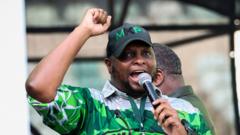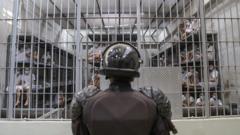In a pivotal moment for South Africa's G20 presidency, the absence of key US officials highlights growing geopolitical tensions between the two nations.
South Africa Hosts G20 Talks Amid US Withdrawal

South Africa Hosts G20 Talks Amid US Withdrawal
Tensions Rise as US Boycotts Key G20 Meeting in Johannesburg
Despite the snub from US Secretary of State Marco Rubio and Treasury Secretary Scott Bessent, South African President Cyril Ramaphosa emphasized the necessity of multilateralism in addressing pressing global challenges. Speaking to G20 foreign ministers in Johannesburg, Ramaphosa lamented the increasing fragility of global relations exacerbated by intolerance, conflict, and climate change. With the US firmly adhering to its "America First" doctrine, the foreign ministers from major countries such as China, Russia, France, and the UK attended, whereas the US was represented by a deputy envoy.
Ramaphosa underscored the importance of aligning discussions with the UN Charter and international law, reinforcing South Africa's commitment to represent developing nations’ interests during its G20 presidency—a role it will hold until November 2025 before passing the torch to the US.
The legacy of the Trump administration casts a long shadow, straining ties significantly since its inception. Trump's administration has criticized South Africa's policies, particularly regarding land reform and a recent genocide claim involving Israel. Rubio, in asserting non-participation in the talks, condemned South Africa's agenda as anti-American and detrimental to US interests.
As geopolitical rifts widen, South Africa looks to navigate a complex landscape, while addressing the urgent needs of the developing world amidst a backdrop of intense skepticism from powerful nations. The unfolding situation raises questions about the future dynamics of international cooperation in this era of division.
Ramaphosa underscored the importance of aligning discussions with the UN Charter and international law, reinforcing South Africa's commitment to represent developing nations’ interests during its G20 presidency—a role it will hold until November 2025 before passing the torch to the US.
The legacy of the Trump administration casts a long shadow, straining ties significantly since its inception. Trump's administration has criticized South Africa's policies, particularly regarding land reform and a recent genocide claim involving Israel. Rubio, in asserting non-participation in the talks, condemned South Africa's agenda as anti-American and detrimental to US interests.
As geopolitical rifts widen, South Africa looks to navigate a complex landscape, while addressing the urgent needs of the developing world amidst a backdrop of intense skepticism from powerful nations. The unfolding situation raises questions about the future dynamics of international cooperation in this era of division.





















